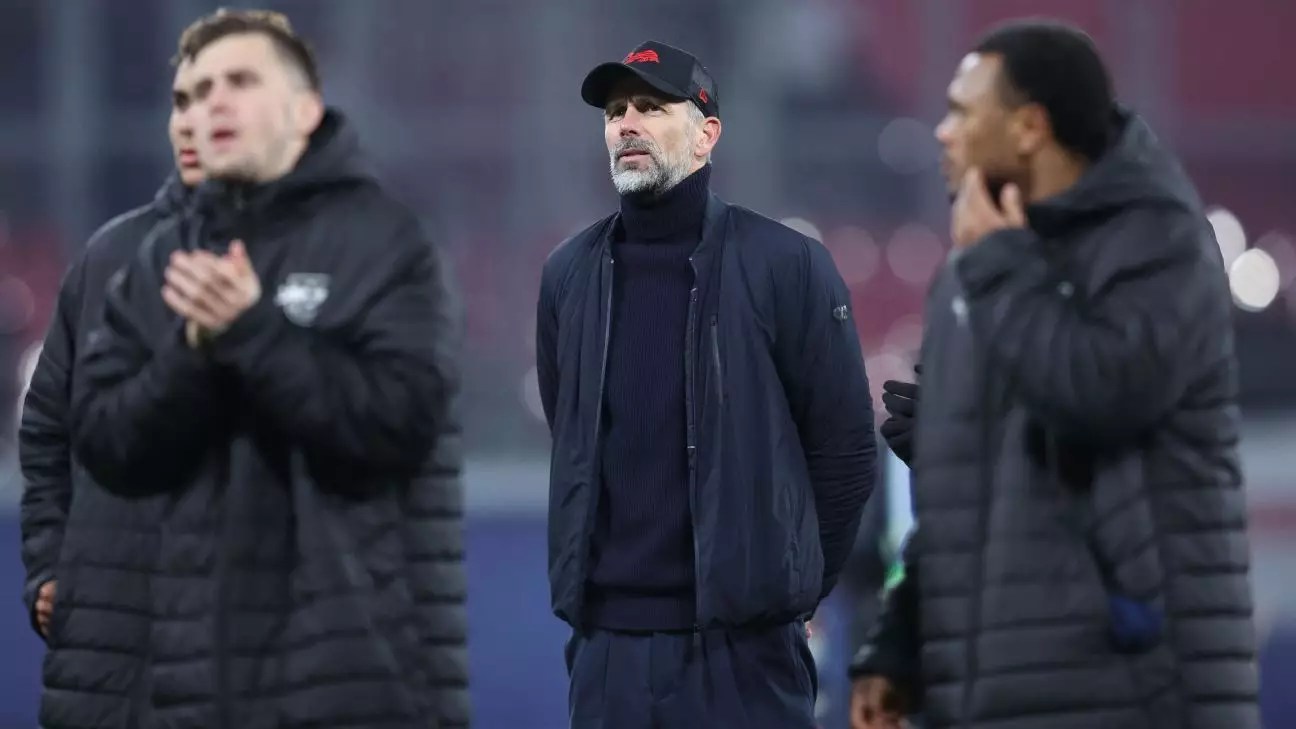In the universe of football, the right fit between a coach and a club can change the trajectory of both. Marco Rose stands out as a unique case within RB Leipzig, a club whose ethos blends local culture with global ambition. His roots in Leipzig and successful tenure at RB Salzburg have instilled him with a profound understanding of the Red Bull footballing philosophy. Unlike many predecessors, Rose embodies adaptability; he does not confine himself to a rigid tactical identity, instead opting for a more nuanced approach that incorporates pieces of Gegenpressing and Umschaltfussball—styles that emphasize aggressive transitional play. This pragmatic approach has not only characterized his coaching style but has allowed RB Leipzig to flourish under his leadership, evidenced by his impressive 826 days in charge, a relatively long tenure in the fast-paced world of elite football management.
However, the path has not been devoid of turmoil. RB Leipzig’s recent campaign in the UEFA Champions League has proven disastrous, culminating in a six-match series of defeats. While injuries to key players like Xavi Simons and David Raum played a part, such setbacks often lead to deeper evaluations of a coach’s strategy and effectiveness. The stark reality of losing to teams like Celtic, especially when pitted against their considerable budget constraints, has brought forth an introspection within Leipzig’s higher-ups regarding the sustainability of Rose’s reign. His ability to navigate crises is currently under scrutiny, especially as discussions surrounding potential replacements, such as Roger Schmidt and Erik ten Hag, have gained traction amid a frustrating but not entirely unexpected decline in form.
Leipzig’s recent DFB-Pokal quarterfinal clash against Eintracht Frankfurt showcases the precarious nature of coaching in such a thriving yet ruthless environment. The match became a crucial turning point; a win could act as a balm to the mounting pressure, meanwhile a loss would likely ignite a firestorm of criticism. Remarkably, Rose’s squad delivered a resounding performance, hinting at the potential for a resurgence amid turbulent waters. Stars such as Loïs Openda and Benjamin Sesko stepped up, giving fans and management alike a glimmer of hope. This victory temporarily quelled the storm of the Trainerdiskussion and provided a momentary reprieve. Nonetheless, as speculation looms about the future following the upcoming Winterpause, the question remains: will Rose’s triumphs outweigh the growing discontent?
As RB Leipzig considers its next steps, it is crucial to reflect on the club’s trajectory post-Oliver Mintzlaff’s ascent. Historically, the absence of patience in leadership decisions has plagued the club, evidenced by the swift departures of coaches like Jesse Marsch and Domenico Tedesco. The only saving grace for Rose thus far is his local connection and an unmistakable rapport with players—a bond that could sway decisions in his favor. As Jürgen Klopp prepares to assume a global role at Red Bull’s soccer division, any shift initiated by Mintzlaff could dramatically affect the torchbearers like Rose, who have borne the weight of local expectations.
Looking ahead, RB Leipzig finds themselves in a somewhat fortuitous position in the DFB-Pokal. With traditional powerhouses like Bayern Munich and Borussia Dortmund out of the running, Leipzig has an inviting landscape to navigate, creating an intriguing opportunity to capture the trophy a third time in four seasons. Bayer Leverkusen poses a formidable threat, having shown excellent form, especially after their recent Champions League exploits. Their dynamically shifting tactical approaches under Xabi Alonso will certainly provide a challenging puzzle for Leipzig should they meet in later rounds.
As we analyze the current state of German football, particularly RB Leipzig, it is critical to acknowledge the inherent unpredictability of the sport. Factors such as player performance fluctuations, managerial decisions, and club ethos interplay to create a fluid environment that is both exhilarating and precarious. The recent resurgence of teams such as St. Pauli amidst uncertainty at the lower end of the Bundesliga paints a broader picture of how football at all levels can pivot with astounding speed. For Rose, the upcoming weeks will be crucial—not just for the immediate future of RB Leipzig, but for his own legacy as a manager in one of Europe’s most vibrant footballing cultures. While predictions remain a gamble, it is clear that the ever-evolving landscape of German football guarantees nothing if not excitement for fans and stakeholders alike.


Leave a Reply